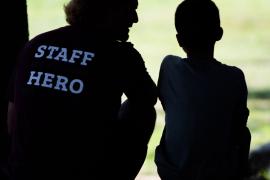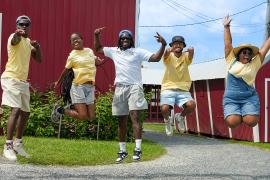Fostering friendships among campers is one of the most important goals of any summer camp program. As counselors, you will play a pivotal role in modeling and teaching your campers the skills they need to make friends, be a good friend to others, and maintain strong friendships.
The importance of your coaching young people in the areas of social and emotional skills has been highlighted in several studies, including the famous 80-year Harvard Study of Adult Development, which found that:
“Close relationships, more than money or fame, are what keep people happy throughout their lives . . . . Those ties protect people from life’s discontents, help to delay mental and physical decline, and are better predictors of long and happy lives than social class, IQ, or even genes. That finding proved true across the board among both the Harvard men and the inner-city participants” (Mineo, 2017).
As a camp counselor, you can have a lifelong, positive influence on your campers’ health, happiness, and success by coaching some of the emotional and social skills that will help them have positive relationships both at camp and throughout their lives. These benefits will far outlast the recreational or athletic skills they gain while with you at camp. As I wrote in a previous article, “Becoming your challenging camper’s social skills coach, and helping with even a small improvement, may be the most impactful thing you do this summer. Friendships are so important for our campers because they are both the source of much childhood joy and the building blocks for later adult relationships” (Monke, 2017).
So what skills, specifically, can you focus on during the short time you will have with your campers this summer? The best place to start is with helping your campers make friends at camp.
How to Make Friends
Leading organized team-building games and discussions, however awkward it may feel for you at first, is critical to your success at helping your campers make new friends. Some important steps to take:
- Use WESTI (Brandwein, 2008) to remember how to greet your campers:
W: Warm smile — It’s important to have a welcoming facial expression!
E: Eye contact — Look them in the eye with your sunglasses off.
S: Shake — Give them a hand shake, high five, or hug.
T: Tell them who you are and how you’re feeling — “Hi, I’m Sunshine. I’ve been so excited to meet you, and I’m so glad you’re here!”
I: Introduce them to another camper who’s already arrived. - By the time all your campers have arrived, make sure each camper has been introduced to each other camper in your group.
- Your first hours with your campers are critical to setting the tone for the session. Make sure you are leading and guiding discussions so every camper (even quieter ones) is included. You may have some campers who knew each other before camp and others who don’t know anyone. Be sensitive to this and direct campers to pair up for activities with someone new. If you have kitchen patrol or other chores, pair a returning camper with a new camper on the first day. Let your campers know that each day the group will have some daily sharing time. That can be at a meal, campfire, or bedtime (whatever works for your camp’s schedule). Start this practice on the very first day. Ideas for your daily sharing can include:
- Highs and lows (highpoint of the day and biggest challenge/hardest moment)
- Three things that went well (helps campers focus on the positive)
- Question of the day (each camper and counselor answers the same question)
- Explain to your campers that making new friends is an important part of their camp experience — both in your cabin groups and the larger camp community. Talk to them openly about what you are going to do to facilitate friendships. Acknowledge that some kids may already have friends but that making new friends will enhance everyone’s experience.
- I like to facilitate the steps to introduce yourself to others and have campers practice it. Campers are willing to participate in activities when everyone is doing it together and when their leaders, who they look up to, present the activity in a positive way. With another counselor or an experienced, outgoing camper, role model how to introduce yourselves to new people using these steps:
- Smile
- Say, “Hi, my name is ______ . What’s your name?”
- Say, “Nice to meet you, ________(use their name).”
- Ask a low-risk question, like “Where are you from?”
- Listen and respond with a follow-up question or comment.
- Ask more questions or offer a small invitation like, “Want to play cards while we wait for lunch?”
- Introduce your new friend to someone they don’t know.
Have them each practice with someone they don’t know (or have only recently met). Expand the practice to meeting another group in camp (whose counselor has also taught the introduction steps).
- Make the practice of introducing themselves a daily practice throughout camp as your campers go to new activities and meet new counselors and campers. Getting comfortable with the skill of introducing themselves is really helpful in making new friends.
Once your campers have started meeting each other and getting comfortable with each other during the first day or two of the camp session, you can move on to teaching them about being a good friend.
Being a Good Friend
Making friends is a great start to friendship, but for friendships to grow, we need to practice being a good friend. Some specific practices that will enhance your campers’ friendships — and teach them skills they can take home — include:
- Celebrate each other’s victories. Make it your group’s culture to cheer each other on and encourage each other. When a camper succeeds, make it a big celebration. This act of celebrating others’ accomplishments is an important part of healthy, positive relationships.
- Notice and talk about your own and your campers’ moods. Model for your campers how to offer comfort when one of your campers feels sad or scared, and join in their excitement when they’re happy. Share your own camp-appropriate stories so campers feel comfortable opening up and being vulnerable with sharing theirs. Make your environment welcoming — with no put-downs or teasing tolerated — so campers are encouraged to share with one another.
- Compliment each other. Consider having part of your day be a time when you compliment each other and build each other up through verbal and written compliments. You can have a compliment box (for older kids) or just do verbal compliments.
- Address issues and resolve conflicts directly. Model and facilitate discussions between campers and with your whole group to address any disagreements or conflicts rather than allow gossiping or complaining to others. Promote trust by encouraging campers to address topics directly with one another.
- Talk with your campers about being a good friend. Once your group is comfortable with one another, lead a discussion about what makes a good friend. Model speaking up for yourself and compromising — sometimes doing the activity your friend wants to do, sometimes you pick. Let your campers come up with their own goals for how they can be a better friend.
Your campers will be learning and practicing new friendships skills throughout their time at camp, but you won’t be going home with them to help them once they’re no longer in the supportive environment of camp. On the final days of camp, encourage discussion about maintaining supportive friendships after camp.
How to Maintain Friendships
To maintain friendships, staying connected is necessary, even when it’s not convenient or the friends live far away from each other. In the final days of camp, talk with your campers about how they can stay connected, not just through the superficial connection of social media, but in deeper ways. Encourage campers to get together face-to-face or talk on the phone (if distance doesn’t allow face-to-face connection). Have campers exchange real addresses so they can send and receive letters and encouraging notes.
Finding supportive, caring friends, and forming positive relationships where you feel a sense of acceptance and belonging, is a lifelong quest. Sadly, some people never find these positive relationships. As the Harvard Study showed, we need to prioritize the forming of positive relationships to maximize our health and well-being throughout life (Mineo, 2017). Camp is the ideal setting to provide youth with some of the tools and skills they’ll need to thrive in relationships.
Equally important, by creating a culture of friendship in your camp, your campers will experience the feeling of belonging and acceptance you only feel when you have found good friends. For some of your campers, this may be the first place they have experienced this kind of warm community. By creating a culture that promotes positive friendships, you will be sending your campers home knowing not just how to make friends, but what positive relationships feel like. Once they have experienced this, they will know what to look for and strive for in their relationships outside of camp.
Discussion Questions |
|
Photo courtesy of YMCA Camp Shady Brook, Deckers, Colorado
References
Brandwein, M. (2008). Training terrific staff! Volume 2: More great tools for outstanding staff development. Martinsville, IN: American Camp Association.
Mineo, L. (2017, April 11). Good genes are nice, but joy is better. The Harvard Gazette. Retrieved from https://news.harvard.edu/gazette/story/2017/04/over-nearly-80-years-harvard-study-has-been-showing-how-to-live-a-healthy-and-happy-life/
Monke, A. (2017, May). Coaching your campers to better friendships. Camping Magazine. Retrieved from ACAcamps.org/resource-library/camping-magazine/coaching-your-campers-better-friendships
Audrey “Sunshine” Monke, MA, with her husband Steve, has owned and directed Gold Arrow Camp (Lakeshore, California) for the past 30 years. She has been a member of ACA since 1989 and was president of the Western Association of Independent Camps (WAIC) from 2007–2010. Audrey researches, writes, and speaks about camp, parenting, friendship skills, and positive psychology. Her upcoming parenting book (Center Street, 2019) offers ideas for bringing the magic of summer camp home. Sign up for Audrey’s book updates at sunshine-parenting.com or contact her directly at [email protected].



